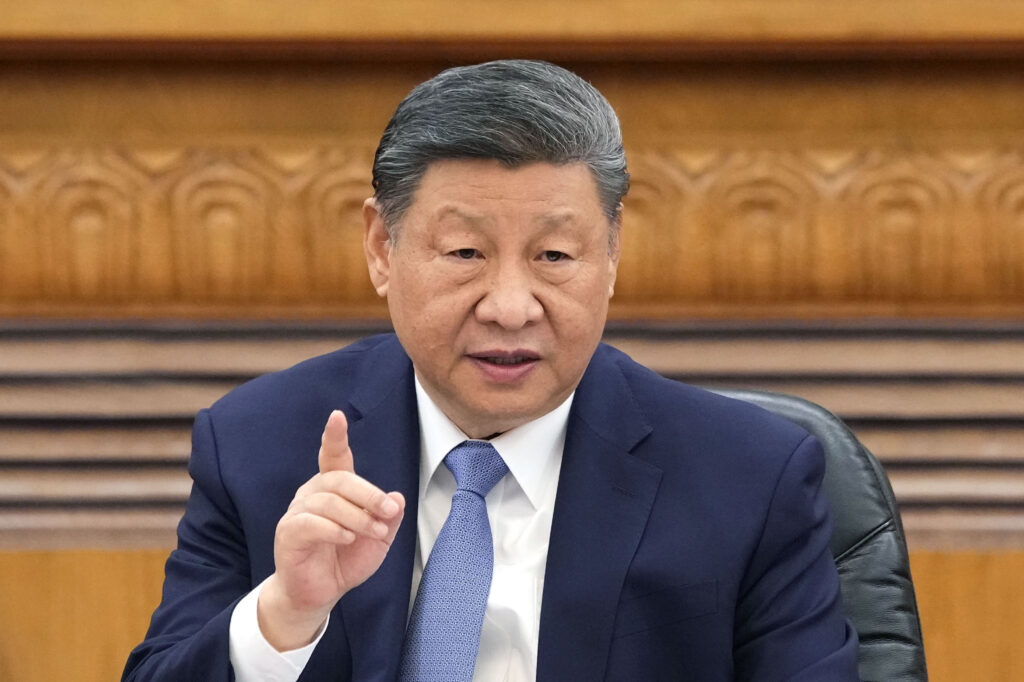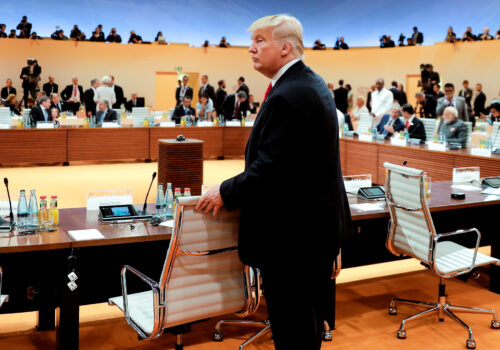US President Donald Trump’s tariff blitz has morphed into a US-China trade war, with tariffs exceeding 10 percent on most countries now given a ninety-day reprieve while those on China are hiked to a dizzying 145 percent, following Beijing upping its levies on the United States to 84 percent. So what’s likely to come next? Well, for one, the White House appears to have badly miscalculated in thinking China’s leaders “want to make a deal” and would rush to the negotiating table.
“The US threat to escalate tariffs on China is a mistake on top of a mistake and once again exposes the blackmailing nature of the US,” China’s commerce ministry said on Tuesday. “China will never accept this. If the US insists on its own way, China will fight to the end.”
Almost exactly one year ago, in discussions I had in Beijing on the prospect of a US-China trade war under a future US president, officials repeatedly mentioned a secret weapon they held ready to wield: the ability of China and its people to “eat bitterness” or chiku.
What does that mean? Chiku is regularly raised by Chinese to describe their ability to endure hardships during difficult times, including in service of a supposed greater national goal. During the Mao Zedong era it was on display during the Great Leap Forward, the horrendously misguided policy that aimed to see China surpass the United Kingdom in steel production and that ultimately led to famine. More recently, this attitude was seen during China’s national campaign to stop the spread of COVID-19. And the fact is not lost on the authoritarian leaders in Beijing that the Trump administration will have to deal with growing pushback from the American people if, as expected, the trade war leads to inflation and job losses, while China will likely face less public pressure.
China has been preparing for this conflict for a long time, including by diversifying its trade away from the West.
In a sign of how seriously China is taking the prospect of a trade war, an official compared China’s resolve—albeit indirectly—to that shown during armed conflict. On April 9, Liu Pengyu, spokesperson for the Chinese embassy in Washington, shared a video of Chinese President Xi Jinping solemnly saying that “intimidation or pressure will never work on the Chinese nation,” a clip from a speech that Xi gave in 2020 on the occasion of the seventieth anniversary of China’s entry into the Korean War (official Chinese name: “The War to Resist US Aggression and Aid Korea”).
Another reason Beijing is unlikely to come rushing to Washington with concessions: Many Chinese officials share a strong belief that they are engaged in an existential struggle with the United States, with both countries vying for economic, political, and military supremacy. While that contest began years ago, they see the trade war as the latest iteration and believe that any concessions would be inevitably met with more pressure. To give in to US demands, they seem to believe, would likely undermine Xi’s carefully constructed reputation as a forceful global leader, which is important for his standing both at home and abroad.
China has been preparing for this conflict for a long time, including by diversifying its trade away from the West. Chinese exports to the United States account for 14.7 percent of China’s total in 2024, down from 19.2 percent in 2018, while overseas shipments to Southeast Asian and Belt-and-Road countries have grown, according to Beijing. Overall, about 30 percent of China’s exports last year went to Group of Seven (G7) wealthy countries, down from 48 percent in 2000, says San Francisco-based Matthews Asia. At the same time, China’s share of global exports actually has grown by a percentage point, to 14 percent, since Trump’s first term.
Beijing too has strategically lessened its reliance on important commodities from the United States, such as soybeans, the majority of which are now bought from Brazil, and it has pushed for greater food self-reliance. “We have been engaged in a trade war with the US for eight years and have accumulated rich experience in this struggle,” the official mouthpiece newspaper People’s Daily said in a front-page commentary on Monday. “We have not closed the door to negotiations, but we will not take chances either. Instead, we have made all kinds of preparations to deal with shocks.”
In recent days, Beijing has strategically targeted industries such as agriculture that are located largely in Trump-supporting red states, with new tariffs on wheat, beef, pork, and soybeans. And it has slapped restrictions on the export of more rare-earth minerals, which are used to manufacture everything from smartphones and automobiles to advanced semiconductor chips and anti-ballistic missile systems. At the same time, China has added a host of new US companies, including drone maker Skydio, to its export control list, expanded its unreliable entities list, and strengthened its anti-foreign sanctions law—all part of a growing toolkit for economic retaliation. Meanwhile, US firms that are deeply reliant on China for global sourcing, such as Walmart, have been called in and warned to not exert pressure on Chinese suppliers to cut prices, while China’s state planning agency has told Chinese firms to delay any planned investments in the United States.
Finally, Beijing may see an abrupt decoupling from the United States as unpleasant, but it also fits in with China’s long-term goal of rebalancing its economy toward one that is far more reliant on domestic consumption, an objective stressed repeatedly at the annual “two sessions” legislative meetings in March.
“In the face of high tariffs that continue to shrink the trade space with the US, we must take expanding domestic demand as a long-term strategy, strive to make consumption the main driving force and ballast of economic growth, and give play to the advantages of our large market,” said the People’s Daily in its commentary.
With Beijing digging in, the question for Washington becomes: How much bitterness are Americans prepared to swallow in return?
Dexter Tiff Roberts is a nonresident senior fellow at the Atlantic Council’s Global China Hub and the Indo-Pacific Security Initiative, which is part of the Atlantic Council’s Scowcroft Center for Strategy and Security. He previously served for more than two decades as China bureau chief and Asia News Editor at Bloomberg Businessweek, based in Beijing.
Further reading
Tue, Apr 8, 2025
No one is coming to save the global economy
New Atlanticist By Josh Lipsky
Neither the Group of Twenty nor the Federal Reserve should be expected to use their playbook from previous economic crises to respond to economic shocks caused by US tariffs.
Tue, Apr 8, 2025
‘How did things ever get so far? It was so unfortunate, so unnecessary.’
Inflection Points Today By Frederick Kempe
As a global trade war heats up, The Godfather films offer a way to think about US President Donald Trump’s tariff strategy and the market fallout that has resulted.
Tue, Apr 8, 2025
The EU could respond to Trump’s tariffs with a new ‘anti-coercion instrument.’ Here’s what to know.
New Atlanticist By
Confronted with the latest round of US tariffs, the European Union is considering a new but untested tool in its economic-security toolbox.
Image: Chinese President Xi Jinping speaks during a global business leaders meeting he hosted at the Great Hall of the People in Beijing on March 28, 2025. (Kyodo)



